Opposition Says Government Measures for Business Sector Belated
ZAGREB, 16 Feb 2022 - Opposition MPs on Wednesday welcomed the government's measures to alleviate the impact of rising inflation on citizens, VAT reduction and its aid scheme, but noted that measures for the business sector were insufficient and belated and warned that margins could grow and prices stay the same.
SDP MP and former finance minister Boris Lalovac welcomed the scheme, noting that it was comprehensive and generous.
"These measures will definitely alleviate the impact of inflation, the market will stabilise and there are instruments to alleviate emergency situations," he said, adding that it would be good if the government introduced price monitoring to establish if VAT reduction had actually helped reduce prices of products for citizens.
Stephen Nikola Bartulica of the Homeland Movement said that the government should have reacted sooner, that its measures were welcome but few and belated.
Marijan Pavliček of the Croatian Sovereignists said that the government's measures were partially good but belated and that more attention should be given to farmers given that prices of their production materials "have gone up by 400%".
Romana Nikolić of the Social Democrats, too, believes the government's measures are belated and partially misdirected.
She recalled that her party group had proposed reducing the VAT rate on electricity and gas and raising the non-taxable income from HRK 3,800 to 5,000, which would result in a HRK 300 increase in all wages. Reducing VAT on food can result in an increase in trade margins while prices will remain the same, she warned.
Anka Mrak Taritaš (GLAS) said the government's measures for households were good and fair, but that those for the business sector were not sufficient and were belated.
"The government should accept the Opposition's proposals and reduce the price of labour to help the business sector," she said.
Zvonimir Troskot of the Bridge party believes the measures are belated but he welcomes the reduction of VAT and the redirecting of social transfers from the Energy Efficiency Fund.
He pointed to a lack of a long-term energy policy.
Sandra Benčić of We Can! said that the measures exceeded the expectations.
"I believe the social package is good, that it covers a broad group of people, which is good. It is good that all households will receive payments for heating, gas and electricity costs," she said, adding that subsidies for the business sector should have been higher.
She also welcomed the reduction of VAT but warned that without control mechanisms for extra profit from margins, citizens would possibly not feel the lowering of prices.
For more, check out our politics section.
Croatia-Saudi Arabia Relations Intensifying, Government Says
ZAGREB, 16 Feb 2022 - Croatian Prime Minister Andrej Plenković met with Saudi Arabia's foreign minister, Prince Faisal bin Farhan Al Saud, on Wednesday the government said in a press release.
The two officials reaffirmed the good relations between Croatia and Saudi Arabia, which the opening of embassies in Zagreb and Riyadh is expected to intensify.
Plenković and Prince Faisal expressed readiness to organise a Croatian-Saudi business forum.
They also discussed the situation in Bosnia and Herzegovina, with Plenković saying that key for its prosperity and European future was that it was a stable country where the equality of the three constituent peoples was honoured.
The two officials also discussed the current situation on the energy market and the possibility of developing cooperation in energy.
For more, check out our politics section.
Central Bank Warns of Continued Financial Stability Risks
ZAGREB, 16 Feb 2022 - Financial stability risks remain increased compared to the period before the crisis due to uncertainties surrounding the end of the pandemic, rising inflation, residential real estate price hikes, and geopolitical risks, the Croatian National Bank (HNB) Council concluded on Wednesday.
The economy continued to grow in the last quarter of 2021, albeit at lesser intensity than previously in the year, with industrial production increasing, while the real retail turnover and construction stayed at Q3 levels, the HNB said in a press release.
In Q4 2021, employment continued to increase while the unemployment rate dropped, making their levels better than before the pandemic. Nominal pay growth also continued to accelerate, while inflation resulted in a decrease of the real pay average.
In December, the annual inflation rate increased to 5.5% from 4.8% in November. Higher food prices contributed the most to that. Together with energy prices, they are increasingly influencing inflation.
The continuation of expansionary monetary policy continues to stimulate the fall of banks' interest rates. Keeping interest rates on the money market at zero is accompanied by a mild increase in sovereign bond yields.
At the end of last year, bank lending increased 3.9% year on year, just as it did at the end of 2020. Household lending went up from 2.1% in December 2020 to 4.5% last December, primarily as a result of a strong increase in housing loans. Corporate lending decreased from 5.6% to 2.3%.
Although a strong economic recovery enabled a gradual revocation of government aid to businesses, new waves of the pandemic continue to cause problems in global supply chains, stimulating price growth.
Hence, there is a prominent risk of long-term inflationary pressures and higher inflation than currently forecast, which could prompt a faster and stronger tightening of the monetary policies of the largest monetary markets' central banks.
Increased volatility on financial markets at the start of this year is reflected in uncertainty about inflation trends, the evolution of monetary policies and expected interest rate growth.
Residential real estate prices increasingly further from fundamentals
Last year saw a strong increase in housing loans in Croatia as well as residential real estate prices, which went up to 9% in Q3. Those prices are moving further and further from long-term trends and macroeconomic fundamentals, increasing the risk of their fall in case of economic disruptions.
Increased household borrowing is accompanied by relatively mild borrowing standards which again this year, will be supported by government subsidies. These may, at the start of the repayment period, pose a smaller burden on borrowers but when the subsidies expire, they increase repayment costs as well as vulnerability to possible shocks.
In response to the continued accumulation of cyclical systemic risks, notably the rise in residential real estate prices and housing lending, the HNB has announced increasing the countercyclical capital buffer rate for Croatia from 0% to 0.5% as of 31 March 2023.
The aim is to set aside additional capital in time in order to boost the resilience of credit institutions to possible losses due to cyclical risks, the press release said.
For more, check out our business section.
Sting at Arena Zagreb Postponed Until Autumn, New Concert Date Announced Soon
February 16, 2022 - Sting at Arena Zagreb has been postponed until autumn this year due to the coronavirus pandemic. The official date should be announced soon.
Due to the current restrictions caused by the pandemic, Sting's concert at Zagreb Arena, which was supposed to take place this spring, has been postponed until autumn. Sting was scheduled to perform at the Arena Zagreb on March 21, as part of his acclaimed My Songs tour, where he performs his favorite songs, written during the 17-time Grammy winner's glorious career, both with The Police and as a solo artist. The new concert date will be announced soon, and all tickets purchased so far will be valid for the new concert date. Furthermore, a refund for everyone unable to attend the concert in autumn will be possible up to 30 days after announcing the new date.
Hailed as a “masterful performance from start to finish,” the concert “takes fans on a musical journey through time,” with hits like “Fields of Gold,” “Shape of My Heart,” “Roxanne,” and “Demolition Man” and makes one an unforgettable event. Fans can also expect the songs "Englishman In New York,” “ Every Breath You Take,” “Message In A Bottle,” and many of Sting’s other big hits.
On tour, Sting will be accompanied by an electric rock ensemble that includes Dominic Miller on guitar, Josh Freese on drums, Rufus Miller on guitar, Kevon Webster on keyboards, Shane Sager on accordion, and Melissa Musique and Gene Noble as backing vocals. In addition, a special guest and frontman for Sting will be his son, musician Joe Sumner.
Late last year, Sting released the acclaimed album The Bridge, which presents different stages and styles from his unrivaled career and draws inspiration from rock n 'roll, jazz, classical music, and folk. Written and recorded during the pandemic, this new collection of poems reveals Sting’s reflections on personal loss, separation, lockdown, and extraordinary social and political turmoil.
Apart from the Zagreb concert, all European shows that were to take place from March 7 to 21, 2022, have been postponed.
OLD DATE: CITY: LOCATION: NEW DATE:
05-March 2022 Riga, LV Arena 24-Sept. 2022
07-March 2022 Tampere, FI Tampere Deck Arena 20-Sept. 2022
09-March 2022 Kaunas, LT Zalgirio Arena 25-Sept. 2022
13-March 2022 Kosice, SK Steel Arena 28-Sept. 2022
15-March 2022 Cluj-Napoca, RO Sala Polivalenta 30-Sept. 2022
16-March 2022 Budapest, HU Budapest Arena To Be Confirmed *
17-March 2022 Debrecen, HU Fonix Arena 29-Sept. 2022
19-March 2022 Sarajevo, BA Zetra Olympic Hall To Be Confirmed *
21-March 2022 Zagreb, HR Arena Zagreb To Be Confirmed *
For more, check out our lifestyle section.
Art Gallery Opened in Split Hospital, Named after Architect Who Designed the Building
February 16th, 2022 - The gallery is named after Zoja Dumengjić, the architect who designed the hospital complex in Firule
It’s not every day that you hear about public medical institutions introducing art into their spaces, but the Clinical Hospital Center (KBC) in Firule, Split did just that by establishing a gallery in its central building.
The Zoja Dumengjić Gallery, named after the architect who designed the hospital complex in Firule, was opened at the ground floor of the central building of KBC Split on February 14th. As reported by Vizkultura, this was a joint project of the Croatian Association of Visual Artists Split (HULU Split) and the KBC Split. The initiative originates from the 41st Split Salon, named Not Completely Lost for Each Other and curated by Ivana Meštrov in collaboration with Ana Janevski.
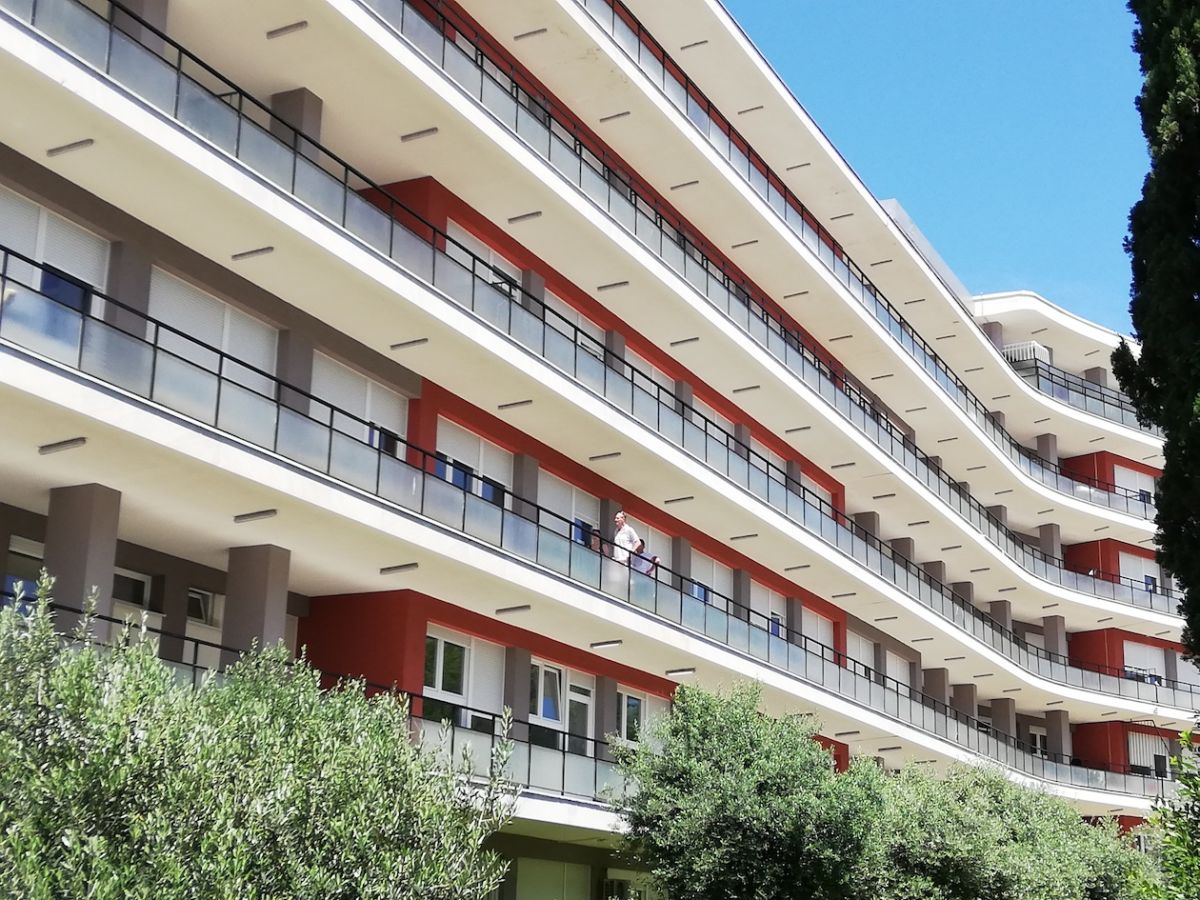 Firule Hospital / Image by Sonja Leboš, UIII Archive
Firule Hospital / Image by Sonja Leboš, UIII Archive
The newly established gallery is introducing itself to the public with its first exhibition, named Retropolis. It’s a project of the Association for Interdisciplinary and Intercultural Research (UIII), presented by visual anthropologist and ethnologist Sonja Leboš and visual artists Stella Leboš and Luana Lojić.
Retropolis is dedicated to Dumengjić, the famous architect and designer of the Firule general hospital in Split that opened in 1951.
‘The gallery will be modular and fluid, without a permanent location within the Clinical Hospital Center, and adaptable to the nature and diversity of media featured in contemporary art. However, the Zoja Dumengjić Gallery project is permanent in terms of its long-term intention. Such positive collaborations are truly rare, even in international terms, and make us especially happy as artists’, explained President of HULU Split Vice Tomasović.
Zoja Dumengjić (1904-2000) worked as a designer at the Institute of Hygiene and the School of Public Health in the 1930s, where she specialised in healthcare facilities and was largely inspired by those designed by the renowned Finnish architect Alvar Aalto.
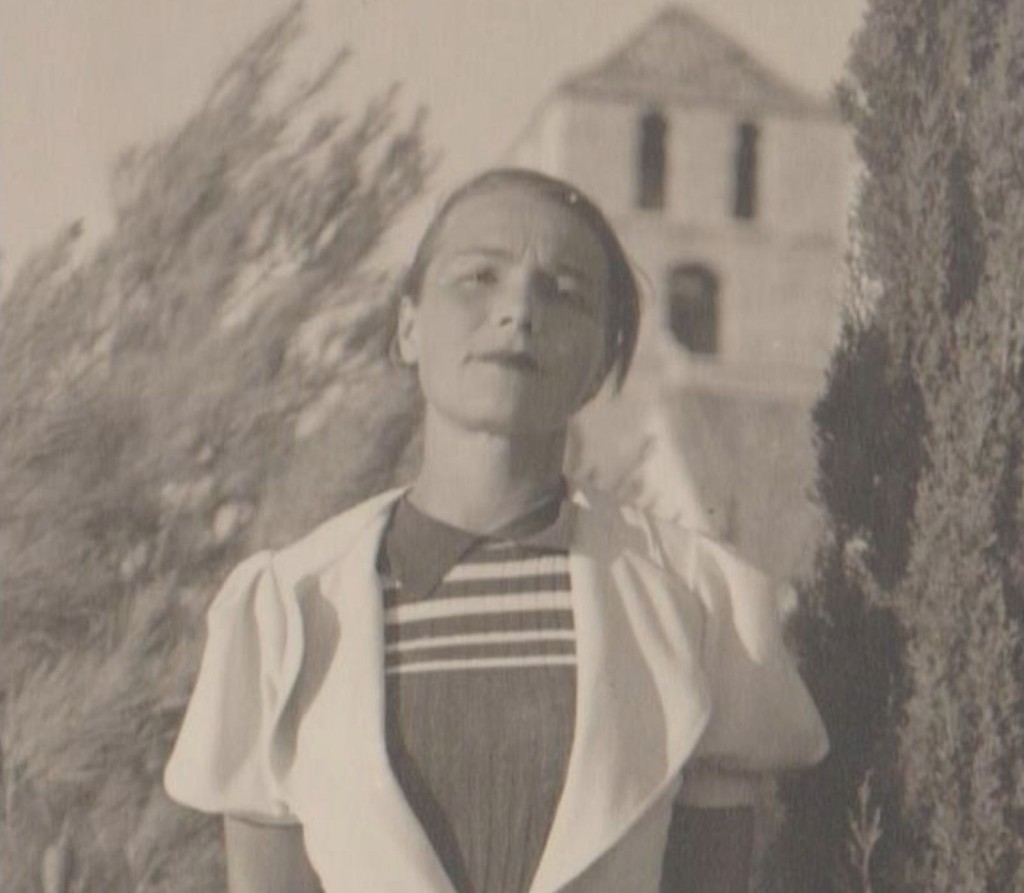 Zoja Dumengjić / Archives of Zoja and Selimir Dumengjić
Zoja Dumengjić / Archives of Zoja and Selimir Dumengjić
Dumengjić's work wasn’t entirely unrecognised during her long and prolific career: she won the Viktor Kovačić Lifetime Achievement Award in 1979, and received the Charter of the Split General Hospital in 1984 for her outstanding contribution to the development of the Firule hospital.
Directly inspired by the work of Zoja Dumengjić, the artworks that were displayed at the 41st Split Salon point to the importance of universally accessible architectural design for health. This principle is engrained in the very idea that led to the gallery being established in KBC Split in the first place.
‘I believe that the Zoja Dumengjić Gallery, in cooperation with HULU Split, will operate creatively and achieve long-term success within the KBC; that it will continuously strengthen Zoja Dumengjić's vision of architecture and visual arts in the service of health, but also make our patients and healthcare staff more familiar with the life and work of the architect who designed the Split hospital. I am especially glad that the gallery’s opening on the eve of the KBC Split Day which marks the merging of Firule, Križine and Toplice facilities into a joint institution’, said Dr. Julije Meštrović, director of KBC Split.
Carnival in Eastern Slavonia: An Intro to February Masquerade Traditions (Part I)
February 16th, 2022 - In Croatia, after Christmas and New Year's, February is usually reserved for the Carnival, which is tightly connected with the Masquerade tradition that leads to the Carnival as an intro to Lent and later, to Easter. Each region has its own tradition that has been maintained for centuries. A look into Carnival in Eastern Slavonia.
The Carnival (Poklade) is a calendar custom between the Epiphany (January 6) and Lent (Korizma). It is marked by masked processions and parties, merriment, madness and debauchery, and an abundance of food and drink. The highlight of the event is the last Sunday, Monday, and Tuesday (Shrove Tuesday) before Ash Wednesday. Its roots don’t have anything related to Christianity - primarily of magical, apotropaic significance. Any disguise, clothes worn on the wrong side, deafening noise, pouring ashes, and more, should drive away the winter, demons, and evil forces that repel their actions from people, livestock, homes, and crops. Carnival events in the Croatian folklore tradition can be divided into two main types. One type is referred to as lupercal; they are seemingly more archaic, common in the rural and livestock areas. Participants are groups of men dressed in animal skins, with bells hung on their bodies or worn on their hands. The second type of carnival event in Croatia is saturnal; they occur in cities, particularly common on the Adriatic coast and island areas. These usually contain less magical features and are more focused on entertainment and social criticism. As mentioned before, even though the event overlaps with Christian holidays, the Catholic Church has been trying to suppress these traditions for centuries because of the opposing nature to every existing authority throughout history.
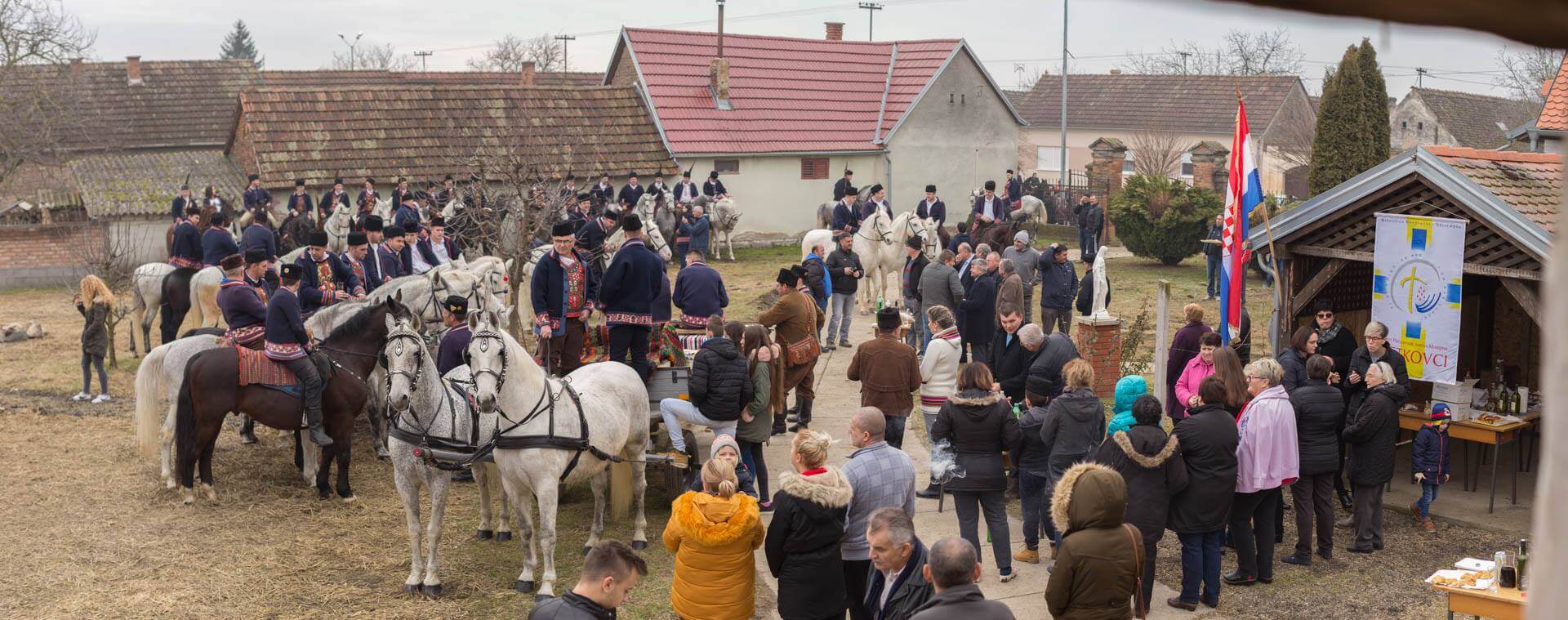
Photo credit: Marko Miličević - načelnik Općine Ivankovo
The Eastern Slavonian Carnival is used for the hedonistic type of “partying” before Lent - a time for mourning, renunciation, and penance. Every village has its own day for organizing the Carnival, it all depends on when Lent starts. Carnival time starts with Masquerade (Maškare), more precisely, the procession of rural masquerades with participants disguising themselves in various characters. Men are mostly dressed as women and women are dressed as men. Masked groups visit every house in the village and sing in front of them for gifts like sweets, food, and drinks. After that, “masqueraders” thank the hosts and continue their journey through the village looking for more gifts. However, in the 2000s, these masked groups became groups of children who would go on tour all over the village after school, singing and seeking gifts from villagers. If a host doesn’t react to the singing of masked children and doesn’t come out of the house, houses get “attacked” by rotten eggs. This tradition probably came into relevancy in the last 20 years or so because it is impossible to find a legit source about it and it is not a really pleasant experience, especially if you need to clean rotten eggs off the walls of your house.
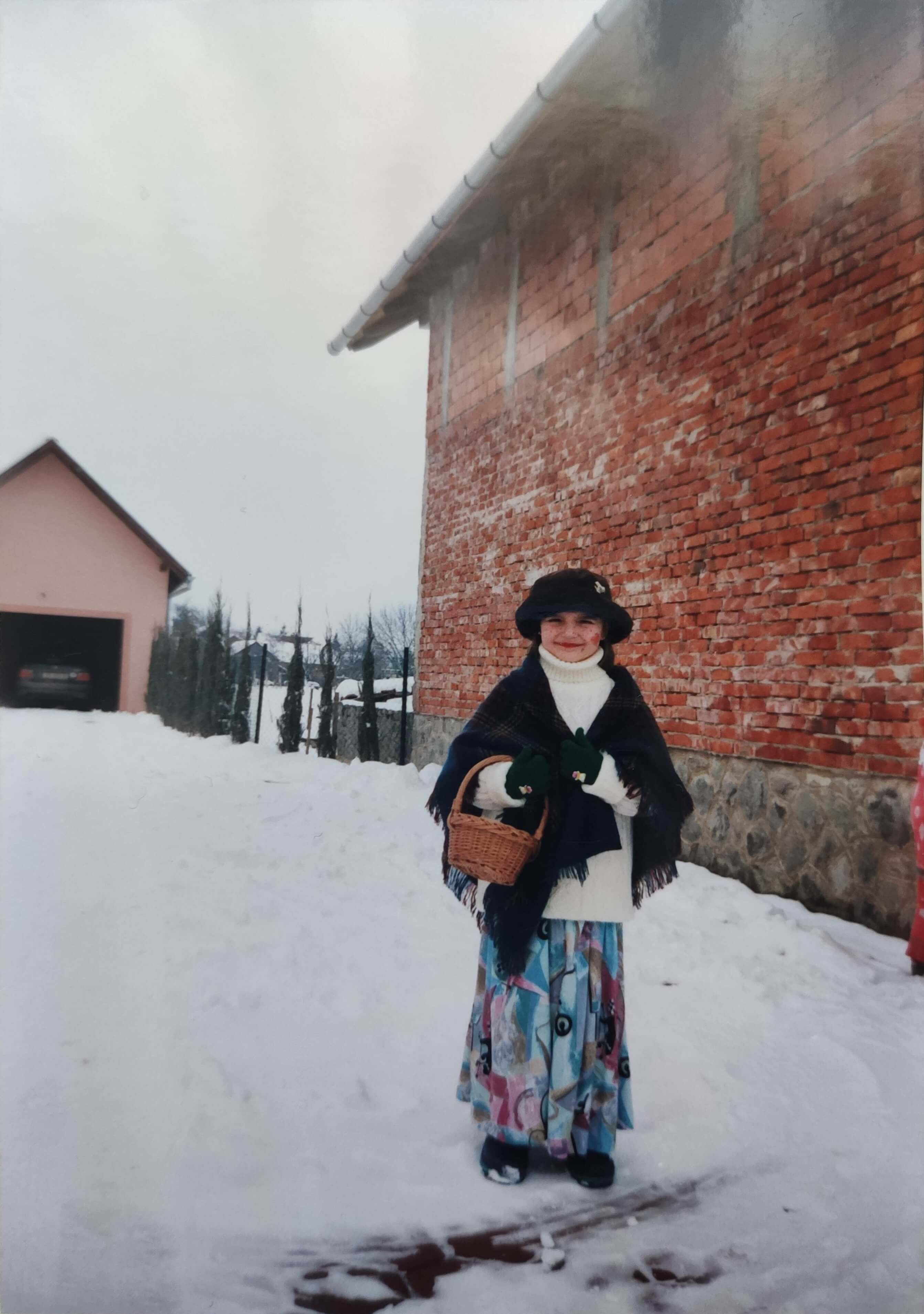
My sister ready for masquerade with her friends, at the beginning of 2000s - Private album
A huge part of the Carnival in Slavonia is the so-called Carnival riding (Pokladno jahanje) which is a tradition that goes back all the way back to the 18th century. Carnival riding came to prominence during Military Frontier (Vojna Krajina) and some Slavonian villages maintained it until after Second World War. The custom was revived after the Homeland War and again became one of the most important events in Slavonia. Riding through the village, the riders would stop at houses of certain families who treated them with Slavonian food and drinks and they usually repay them with a song. After leaving the host's house, the horsemen would sing “Domaćine, od srca ti hvala, što nam tvoja desna ruka dala” (Thank you, hosts, thank you from the bottom of our hearts, what your right hand has given us”). This type of celebration is still going strong and has more and more riders every year, in an effort to preserve the tradition and identity of Slavonia. What is also characteristic of this Carnival is that in some places in Slavonia masked plowmen come with the plow to plow village streets or yards and for that job they get rewarded with sausages, sweet cakes, and donuts (in Eastern Slavonian slang “krofne”) by hosts.
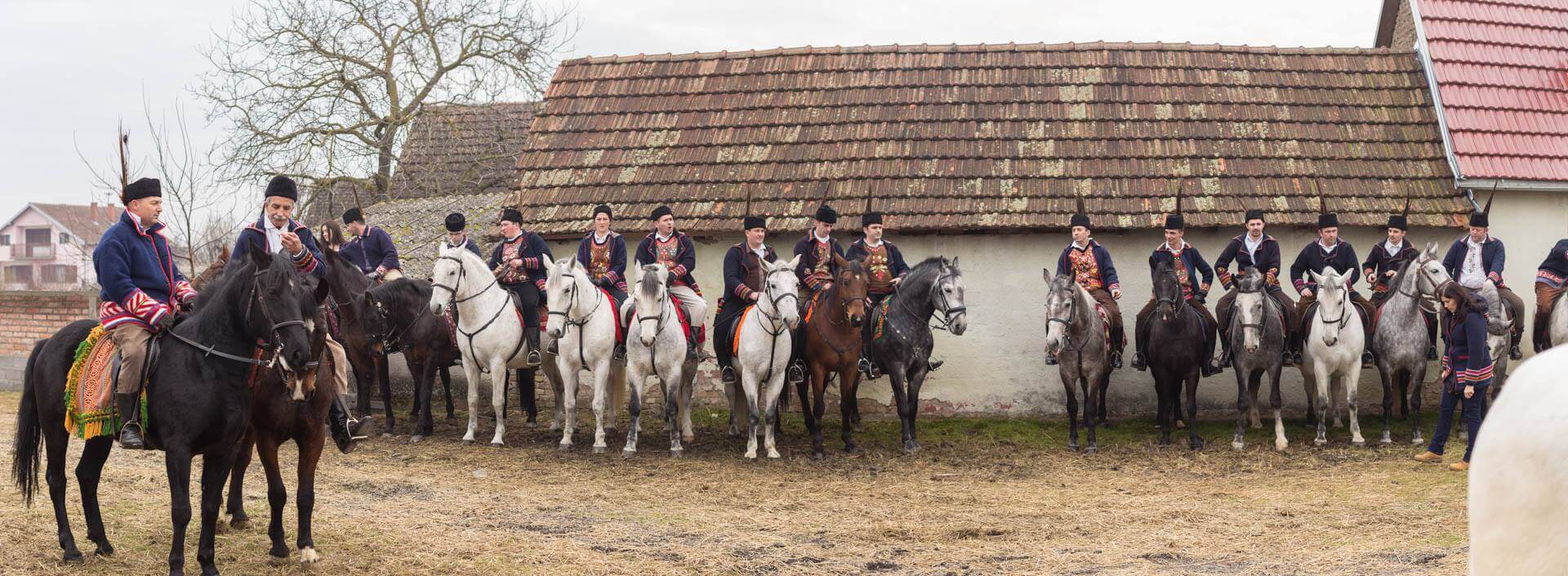
Horsemen getting ready to start their tour through the village - Photo Credit: Marko Miličević - načelnik Opčine Ivankovo, Facebook page
This event, as mentioned before, is an intro to Lent and lastly Easter. Apart from organized games and parties, Carnival is also a great place to introduce the traditional food and drinks Slavonia has to offer. However, that needs its own article. Until next time.
For more, check out our lifestyle section.
SDP Leader: I Didn't Violate Any Law, We Aren't All the Same
ZAGREB, 16 Feb (Hina) - Social Democratic Party (SDP) leader Peđa Grbin said on Wednesday that he did not breach any law for receiving a Living Away from Home Allowance (LAFHA), and rejected the claim that all politicians are the same when it comes to utilising perks.
"I am being accused today of using something that I have a right to by law. This is not an issue of whether I violated the law but whether my conduct was ethical and moral," Grbin said in the national parliament, reacting to an article in the daily press that he has been paid LAFHA as a lawmaker because his hometown is Pula yet he is living in Zagreb with his wife and child.
Grbin rejected the claim that all politicians are the same, saying that there are differences between him and for example, Defence Minister Mario Banožić or the Prime Minister's chief of staff Zvonimir Frka Petešić, with regards to violating the law.
Grbin explained that LAFHA is not related to family status or where one's family lives, but where you are from. He believes that MPs who are not from Zagreb should not be called out for these matters, because the Sabor cannot solely represent Zagreb and its inhabitants.
"I do not wish to renounce my hometown. Pula is my town while Zagreb is where I am performing my political duties," said Grbin.
Asked where he lives precisely, Grbin said he too would like to know because he is neither in Zagreb nor in Pula, but his work takes him everywhere.
He explained that his child is still not going to kindergarten because he is only eight months old and spends most of the time with his mother in Pula who is on maternity leave. Grbin added that he decided this year that his child would go to kindergarten in Zagreb and then asked for LAFHA to be ceased. "Not because I considered that I was not entitled to it, but rather because I thought it would not be fair to be paid that allowance," said Grbin.
Wednesday's edition of the Jutarnji List daily claimed that Social Democratic Party MPs Arsen Bauk and Peđa Grbin have mastered the art of utilising all the perks available for national legislator. Even though both have lived in Zagreb for more than 10 years, have their families with them in Zagreb, partners that are employed in Zagreb and children were born in Zagreb, neither of them have changed their registered residency. Bauk is still registered on Brač Island and Grbin in Pula. Until a month ago, Grbin was even paid LAFHA which he has now renounced so he can enrol his child in a kindergarten in Zagreb.
For more, check out our politics section.
Croatian Government Unveils €640 Million Support Package to Cushion Energy Price Rises
ZAGREB, 16 Feb 2022 - The Croatian government on Wednesday launched an HRK 4.8 billion (€640 million) package of measures aimed at shielding consumers from rising energy prices.
The package includes the capping of the growth of electricity prices to 9.6% and the growth in prices of gas to 20%.
Furthermore, the Value Added Tax (VAT) rate on gas supplies and some agricultural products will be lowered.
The package also provides a rebate on domestic energy bills.
Unveiling the set of measures, Prime Minister Andrej Plenković said today that the package had been prepared in a systematic manner, and is "timely and all-encompassing".
The package contains the measures targeting households, businesses and agricultural producers, Plenković said adding that the state-run Croatian power provider HEP will also bear a part of the burden to address the rising electricity prices.
The measures encompass tax reduction, subsidies for citizens at risk of energy poverty, and one-off discounts on energy bills for pension recipients, while businesses, farms and fisheries will be entitled to subsidies to cope with the rising energy costs.
Cap for electricity paid to make HRK 460 million disposable to households
The caps on the rise in prices of electricity will make HRK 460 million disposable to households.
The subsidies for households using gas will include HRK 0.10 per kilowatt-hour.
The support will be provided to micro businesses and SMEs with the average annual consumption of gas up to 10 gigawatt-hour, and the discount will be HRK 0.15 per kWh.
The VAT rate on gas and heating energy will be lowered from 25% to 13%, the same VAT already applied on power. The lower VAT is a permanent measure.
VAT will additionally be reduced to 5% on gas as a temporary measure, in place from 1 April 2022 to 31 March 2023.
VAT to be reduced on some food in bid to tackle rising cost of living for households
The VAT rates of 13% will be reduced to 5% for fresh meat, fish, eggs, fruits, vegetables, cooking oils, and baby food and the the standard 25% VAT rate will be slashed to 5% on some items in the agricultural production (fertilisers, plants etc.).
The package aimed at tackling rising costs of living also includes the reduction of the 25% VAT to 13% on feminine hygiene products, such as tampons and sanitary towels.
The coupons for electricity bills for senior citizens at risk of poverty will increase from 200 to 400 kuna a month and will now also be applicable to gas bills.
Pensioners whose monthly income is up to HRK 4,000 will be also entitled to payments between HRK 400 and 1,200 under the the energy support scheme.
(€1 = HRK 7.523717)
For more, check out our politics and lifestyle section.
Državne Nekretnine: Basement Renovated in Line With Law
ZAGREB, 16 Feb 2022 - The Državne Nekretnine state property management company on Tuesday said that the renovation of the state-owned basement used by Prime Minister's chief-of-staff Zvonimir Frka-Petešić, had been conducted in line with law and regulations.
"The renovation of the pertaining basement space in Zagreb was planned within the company's regular business activities and the project was also made public within the company's public procurement operations' plan for 2021", Državne Nekretnine stated in a press release in response to media reports that that the 83-square-metre large basement was renovated and refurbished at a price of 417,000 kuna.
"During the advertised public procurement tender for this project, a total of six bids were submitted, and an independent task force selected the most favourable bid", Državne Nekretnine said, adding that the most favourable bid was HRK 333,707.
The renovation was conducted to keep the state-owned property in a good state of repair, it emphasized.
Asked about the renovation of the basement where his chief-of-staff Frka-Petešić keeps his books, Prime Minister Andrej Plenković said on Tuesday that the Državne Nekretnine state property management company would explain everything.
"That has nothing to do with him. This... shameful, orchestrated lynching campaign that has been going on against Frka-Petešić for a month is one of the more stupid, irritating and mean things in the media and internet sphere," said Plenković.
For more, check out our politics section.
SDP MPs Grbin and Bauk Champions in Using Parliamentary Perks, Jutarnji List Daily Reports
ZAGREB, 16 Feb 2022 - Social Democratic Party MPs Arsen Bauk and Peđa Grbin have mastered the art of utilising all perks available for legislators, Wednesday's edition of the Jutarnji List daily reported in an article.
Although both MPs have lived in Zagreb for more than 10 years, including have their families living with them, partners that are employed in Zagreb and children born in Zagreb, neither of them has changed their residency. Bauk is still registered on Brač Island, while Grbin in the City of Pula.
The Sabor is paying their rent in Zagreb and both of them are paid tens of thousands of kuna for travel expenses to and from Brač and Pula. Until a month ago, Grbin was even paid a "living away from home allowance" (LAFHA), which he has now renounced so he can enrol his child in a kindergarten in Zagreb.
In the fifteen years that Bauk has been a member of parliament and office-holder, he has managed to deposit about HRK 5.5 million kuna in his bank account and about 40% of his income or HRK 627,000 (€82,919) is deposited in savings. His savings amount to just a little more than the budget paid to cover Bauk's rental costs.
Despite the fact that his wife is a Zagreb local and his child was born in Zagreb about two years ago, Bauk claims that he is living at the government's expense in Zagreb only temporarily.
Bauk admits that he does not receive LAFHA in the amount of 1,000 per month. telling the daily that it would be 'stupid' to receive that perk as he did not live separately from his partner.
However, Bauk doesn't consider it to be stupid that his party leader, Grbin, is in a similar situation and has lived in Zagreb for years and yet taxpayers are not only paying for his rent in Zagreb, but also for each time he travels to his hometown to Pula.
Explaining his entitlement to LAFHA, Grbin said that the parliament decided that that allowance is paid to MPs who do not live in Zagreb, but come from other cities and it is an allowance paid to MPs because of a requirement to live away from their usual place of residence to do their job.
He admitted however that in order to "enrol our child in kindergarten, I have requested the Sabor to cease paying me that allowance and as of 1 January, I am no longer receiving it," said Grbin.
For more, check out our politics section.


